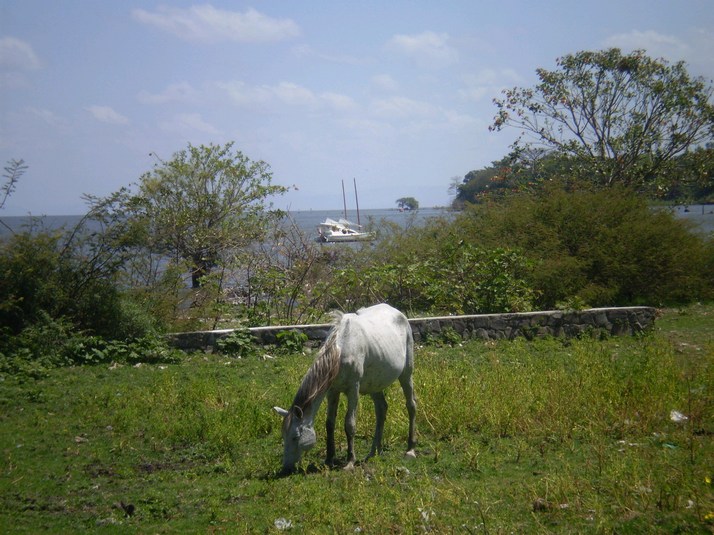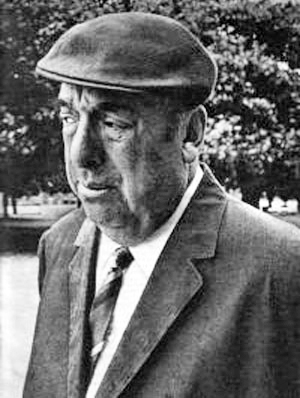|
|
Tuesday, July 12th, 2011
posted morning of July 12th, 2011: Respond
➳ More posts about Pablo Neruda
|  |
Monday, July 11th, 2011
Two more poems from the "el maestro de Tarca" series:
EL MAESTRO DE TARCA (â…¦)
Con el oÃdo atento
al fragor de las olas
y los vientos
el Maestro de Tarca
nos decÃa:
En el rencor del Lago
me parece oÃr
la voz de un pueblo.
|
EL MAESTRO DE TARCA (â…¦)
His ear turned, alert
to the clamor of the waves
and to the wind
el Maestro de Tarca
would tell us:
In the rancor of the Lake
I seem to hear
the voice of a nation.
|
EL MAESTRO DE TARCA (â…ª)
El maestro de Tarca
aconsejó al marinero:
Si tu pensamiento
alcanza menos
que tu corazón,
piensa dos veces:
La nave tiene
la vela a pájaros
y la quilla a peces. |
EL MAESTRO DE TARCA (â…ª)
El maestro de Tarca
gave counsel to the sailor:
If your thoughts
cannot reach
as far as your heart,
then think two times:
Your ships possess
a sail, like birds
and a keel, like fish. |
The four I have not yet made a stab at are going to remain untranslated for the nonce: #2 is a series of couplets about sailing conditions betokened by different cloud covers (after the manner of "Red sky at night, sailor's delight") -- I would not know where to begin with it. #5 warns of a tiny fish called La Pepesca, which will invade a sailor's body via his asshole and devour his innards. (Can't find any evidence pointing to this being a real thing? A couple of sites refer to the tetra astyanax fasciatus as "la pepesca" but they don't mention it being dangerous, which you'd think they would mention...) #6 is a long, attractive poem with advice for what to hunt and to cook during the summertime. #10 is similar to #2, but concerns sailing at night.Besides these, the maestro makes a brief appearance in one of the final poems of the book, "The Islands", which is dedicated to Ernesto Cardenal. Here he is telling the people of the Lake a legend of a once and future king:
-- En Solentiname,
archipiélago de las codornices
pereció Tamagastad
contra los escollos de la Venadita.
Allà lloró la tribu a su héroe.
Allà todavÃa lloran los que pasan
esperando una antigua promesa.
Allà dice la leyenda
que ha de volver a su pueblo
con una palabra nueva.
|
-- In Solentiname,
archipelago where quails nest
Tamagastad bled out his life
on the reefs of Venadita.
His tribe wept there for its hero.
And all who pass by there still weep;
they're waiting on an ancient promise.
For legend tells us there
that he must come back to his people
bearing a new word.
|
posted evening of July 11th, 2011: 1 response
➳ More posts about Poets of Nicaragua
|  |
|
Ellen got some nice photos of us at the show last night -- click through for the slide show.
posted morning of July 11th, 2011: Respond
➳ More posts about Mountain Station
|  |
Sunday, July 10th, 2011
Me and John played our first show this afternoon! We were one of the featured groups at Michael Locker's Songwriters' Circle, at the Crossroads in Garwood -- there were five acts playing rotating sets of three songs apiece, we were on stage three times for a total of about 40 minutes of music -- way more than we've played before for an audience. (Sparse to be sure, but still.) Our set list:
- "Red Red Overalls" by Jeremy -- this song gets a little better and a little faster every time we play it.
- Praying Mantis by Don Dixon
- "Japanese Radio" by John and Jeremy -- we were extremely loose on this song and having a great time. We had never really worked out the arrangement with any precision and ended up not being sure, at a lot of points, whether we were going to go into a verse or a chorus or an instrumental -- but somehow it worked really well.
- NJ Transit by Jeremy
- Walk Right In by Cannon's Jug Stompers
- "Killer Diller Smile" by John
- Highway 61 Revisited by Bob Dylan -- this was an encore in our second set when a guy in the audience asked us to play another song.
- Revelator by Gillian Welch
- "Meet Me in the Morning" by Bob Dylan
It was a great time. Also had a blast meeting and listening to the other musicians on the bill, including Christa Orefice and Anthony Rocha.
posted evening of July 10th, 2011: Respond
➳ More posts about Music
|  |
|
Still thinking about Cuadra, about the teacher and his teachings,
I met up with local cyclists for our Sunday morning ride.
We rode today through glorious weather up to Thomas Edison’s
Old factory in West Orange, to see the rusty old machinery,
The evidence that a genius once called our small hamlet home.
But I didn’t take the tour, still felt like riding, so I split off
From the group and rode up Eagle Rock into the reservation.
It’s a long, slow climb, fantastic when
You get up to the top and see
The valley spread before you,
Tops of trees like ocean waves and
White rooftops like breakers stretching out
Through Hudson County, in the distance see the
Skyline of Manhattan silhouetted in the yellow haze.
Until 2001 that skyline peaked at two glass towers --
Here the county’s built a shrine to the thousands dead who fell that day;
I walked along the path and looked across into the past, remembered
That September morning a decade past, and all the time gone by since then.
This is a different Eagle Rock, no maestro sat here telling riddles;
It’s got its own long history, its meanings and its influence.
I rode back down to meet the group, the wind was blowing past me hard,
It blew away deep memories that had bubbled to the surface,
Cleared away my thoughts of ages past,
My darkening meditations
And the sunshine of this summer morning
Calmed that frothing turbulence --
Rode back home with the group, and now a quiet afternoon.
posted afternoon of July 10th, 2011: Respond
➳ More posts about Cycling
|  |
|
The first and eighth poems in the "el maestro de Tarca" series both feature el maestro seated on Eagle Rock, telling his disciples what is fitting and just.
EL MAESTRO DE TARCA (â… )
Sentado en la piedra del Ãguila
el maestro de Tarca nos decÃa:
Es conveniente
es recto
que el marinero
tenga cogidas
las cosas por su nombre.
En el peligro
son las cosas sin nombre
las que dañan.
|
EL MAESTRO DE TARCA (â… )
Seated up on Eagle Rock
el maestro de Tarca told us:
It is fitting
it is just
that the seafarer
should grasp
all things by their name.
In times of danger
the things without names
are the ones that harm.
|
Carlos MejÃa Godoy sings
about grasping all things by their name
EL MAESTRO DE TARCA (â…§)
Sentado en la piedra del Ãguila
el maestro de Tarca nos decÃa:
Es conveniente
es recto
que el marinero
olvide a las aguas
su aventura.
Estela hecha
tiempo vivido
Estela deshecha
tiempo borrado. |
EL MAESTRO DE TARCA (â…§)
Seated up on Eagle Rock
el maestro de Tarca told us:
It is fitting
it is just
that the seafarer
should entrust his adventure
to the waters.
Wake formed
time lived
Wake dissolved
time erased. |
posted morning of July 10th, 2011: Respond
➳ More posts about Readings
|  |
Saturday, July 9th, 2011
Here are a few resources for the "el maestro de Tarca" poems and more broadly, Songs of Cifar and of the Sweet Sea. I will add to this list over the coming weeks if I find more that seem worth including.
- Sergio RamÃrez, a member of Nicaragua's Academia de la Lengua, delivered a paper on El maestro de Elqui: la narrativa de Pablo Antonio Cuadra when he entered the academy in 2003. It is online at RamÃrez' home page. A shorter version of the same paper is at La Prensa Literaria. RamÃrez also has a short piece in Ancora from 2002, in which he seems to indicate that el maestro de Tarca is Cuadra himself.
- Folk musician Carlos MejÃa Godoy recorded his album "Cantos de Cifar" in 1992. A few tracks are online at YouTube, and I found "El maestro de Tarca" (the first poem in the series) online at Radio La PrimerÃsima.
- The full text of the book is online at turtleislands.net.
posted afternoon of July 9th, 2011: Respond
|  |
|
In the third "teachings of el maestro de Tarca" poem, the customary introduction is reversed: here Cifar is speaking to the teacher. This suggests to me that the other poems in this series, where el maestro is speaking "to me" or "to us", are told from the POV of Cifar. The two main difficulties for me in translating this poem were the conditional tense of "jurarÃa" and the parallelism in the final two lines. I'm not really sure what conditional tense does -- from its name it sounds like it has a similar function to subjunctive. Schulman translates "jurarÃa" as "I would swear", which sounds ok, but makes me ask what the condition is. I am going with "I could swear" which sounds a little more natural to my ears. (As a weak bonus, "I could swear it" scans the same as "jurarÃa" -- though in the rest of the poem, I am not doing much to preserve the metric pattern.) The last two lines, el maestro's response to Cifar, are the koanic element of this poem. In the original there is a strong parallelism: "Lo conocido/ es lo desconocido." I am going with a literal rendering to preserve this parallelism even though I think it mangles the meaning of the words slightly. Schulman uses the wordy "That which is known/ is the unknown", which I think is slightly closer to Cuadra's meaning, but not nearly as pleasant to read.
EL MAESTRO DE TARCA (â…¢)
Maestro, dijo Cifar,
seguà tu consejo
y crucé el Lago
buscando la isla desconocida.
Fui con viento benévolo
a la más lejana, virgen y perdida
Pero
que yo conocà esa isla
jurarÃa!
que su sonoro acantilado
devolvió mi canto un dÃa
jurarÃa!
que era la misma mujer
casi lo jurarÃa!
Sonrió el maestro y dijo:
Lo conocido
es lo desconocido. |
EL MAESTRO DE TARCA (â…¢)
Maestro, said Cifar,
I followed your counsel
and crossed the Lake
in search of the unknown island.
I sailed with a gentle wind
to its farthest point, untouched and lost
But
I knew this island
I could swear it!
her echoing cliffs
had once already returned my song
I could swear it!
it was the same woman
I could almost swear it!
El maestro smiled and spoke:
The known
is the unknown. |
The fourth poem in the series is a sweet little gem.
EL MAESTRO DE TARCA (â…£)
Dijo el maestro
de Tarca:
Coge la cigarra
del ala
Al menos
llevas en la mano
el canto.
|
EL MAESTRO DE TARCA (â…£)
Thus spoke el maestro
de Tarca:
Seize the locust
by its wing
At least
carry in your hand
its song.
|
(I am tampering with the voice of the verb "llevas" in the next-to-last line -- Schulman renders it as "you carry" which is true to the original; whereas "coge" is imperative, "llevas" is indicative.) (Update: here is a better idea.)
posted afternoon of July 9th, 2011: Respond
➳ More posts about Translation
|  |
|
Scattered throughout Cuadra's Songs of Cifar and of the Sweet Sea are eleven short (even "koanic") poems titled "El maestro de Tarca" -- these seem different from the rest of the text. They are printed in italics, and they all begin with the phrase "El maestro de Tarca was telling us" or "was telling me" or similar. I think these poems might be the framework around which the rest of the book is built... Not sure, but that is anyway an interesting idea. Tarca is not known to Google Maps; other Internet sources suggest it is on the island of El Carmen, off the western shore of Lake Nicaragua. Schulman translates "maestro" as "master"; it could also be translated "teacher". My impulse is to leave the phrase "el maestro de Tarca" untranslated. I'm interested this morning in the ninth poem of this series, one which Schulman and Zavala do not include in their edition. It presents a few challenges for the translator; key among them is the term "La Alegradora". "Alegrar" is "gladden", so "alegradora" would be "someone who makes you happy" -- span¡shd!ct.com gives it as an archaic term for "jester". This is pretty clearly not the meaning intended in the poem; a little digging around with Google* turns up a blog entry from No-Nan-Tzin [you will get an adult content warning when clicking this link, you can safely ignore it], who tells us that "alegradora" is the Spanish rendering of the Nahuatl term "tlatlamiani", a prostitute in pre-Columbian Mexico. Well: "prostitute" works semantically in the poem; but why did Cuadra not use "La Prostituta"? Was "alegradora" still idiomatic in 20th-Century Nicaragua? Is the usage intentionally archaic, hearkening back to ancient times (this seems likely)? I believe the Aztec empire included Nicaragua; so this is my working assumption, and I am going to leave "La Alegradora" untranslated. But if a Nicaraguan reader would recognize it immediately as meaning "prostitute", this may be a poor choice.
EL MAESTRO DE TARCA (â…¨)
El maestro de Tarca
me decÃa:
La Alegradora
con su cuerpo da placer,
no con su recuerdo.
Con la mano hace señas
con los ojos llama,
no con su recuerdo.
La Alegradora
es el puerto
la tierra
que sólo es del pobre
en la noche.
|
EL MAESTRO DE TARCA (â…¨)
El maestro de Tarca
was telling me:
La Alegradora
gives you pleasure with her body,
not with her remembrance.
With her hand she beckons
with her eyes she calls you hence,
not with her remembrance.
La Alegradora
is the port
is the land
which the poor man only knows
by night.
|
 * The same round of searches also brought to my attention this ode by Aztec prince Tlaltecatzin, who praises his love as a "precious toasted huitlacoche". The original Nahuatl is here.
posted morning of July 9th, 2011: 3 responses
➳ More posts about Writing Projects
|  |
Monday, July 4th, 2011
 Source material for a poem I posted today in comments at Dave Bonta's Morning Porch -- this is from Pablo Antonio Cuadra's Songs of Cifar and of the Sweet Sea (which, happy day, I discover Tony Bigras of turtleislands.net has uploaded in full). Translation is my own, with reference to that of Grace Schulman and Ann McCarthy de Zavala. Source material for a poem I posted today in comments at Dave Bonta's Morning Porch -- this is from Pablo Antonio Cuadra's Songs of Cifar and of the Sweet Sea (which, happy day, I discover Tony Bigras of turtleislands.net has uploaded in full). Translation is my own, with reference to that of Grace Schulman and Ann McCarthy de Zavala.
Caballos en el Lago
Los caballos bajan al amanecer.
Entran al lago de oro y avanzan
-- ola contra ola
el enarcado cuello y crines --
a la cegadora claridad.
Muchachos desnudos
bañan sus ancas
y ellos yerguen
ebrios de luz
su estampa antigua.
Escuchan
-- la oreja atenta --
el sutil clarÃn de la mañana
y miran
el vasto campo de batalla.
Entonces sueñan
-- bulle
la remota osadÃa --
se remontan
a los dÃas heroicos,
cuando el hierro
devolvÃa al sol sus lanzas
potros blancos
escuadrones de plata
el grito
lejanÃsimo de los pájaros
y el viento.
Pero vuelven
(Látigo
es el tiempo)
Al golpe
enfilan hacia tierra
-- bajan la frente --
y uncido
al carro
el sueño
queda
atrás
dormido
el viento.
| |
Horses in the Lake
The horses come down at daybreak.
They enter into the golden lake, and on
-- wave after wave
the long arched necks, the manes --
into the blinding clearness.
And naked boys
are bathing their haunchesdrunk with light
they're lifting up their ancient image.
They listen
-- ears perked up --
to the morning's subtle trumpet
and they gaze
on the enormous field of battle.
And then they dream-- and glimpse
remote effrontery -- rising back up
to the days of glory,
when steel met
the sun's proud lances
stallions white
and squadrons silver
the cries
of distant birds and
of the wind.
But they return
(Before
the whip of time)
And struck
move slowly back to land
-- they bow their heads --
they're yoked to
the wagon
the dream
remains
behind
asleep
the wind.
|
posted afternoon of July 4th, 2011: Respond
➳ More posts about Projects
| Previous posts
Archives  | |
|
Drop me a line! or, sign my Guestbook.
•
Check out Ellen's writing at Patch.com.
| |

















 today's xkcd
today's xkcd

